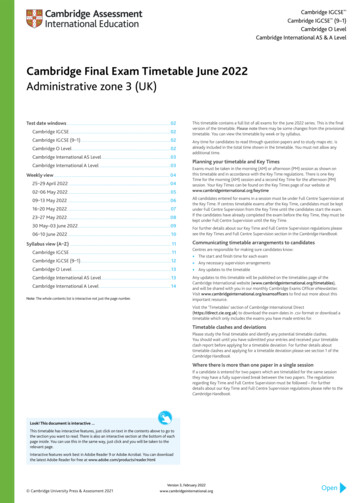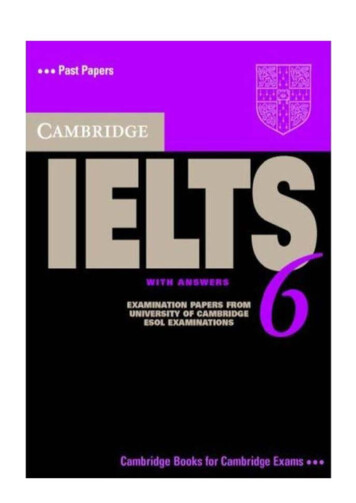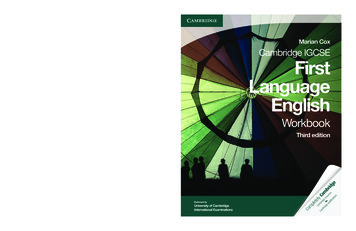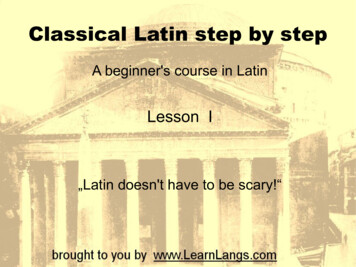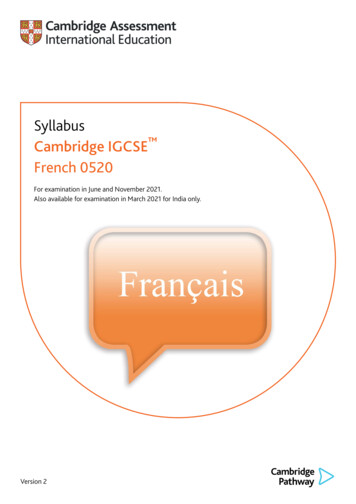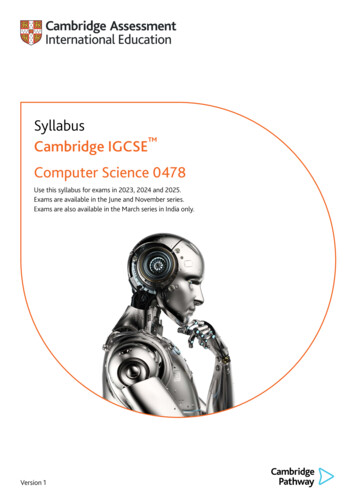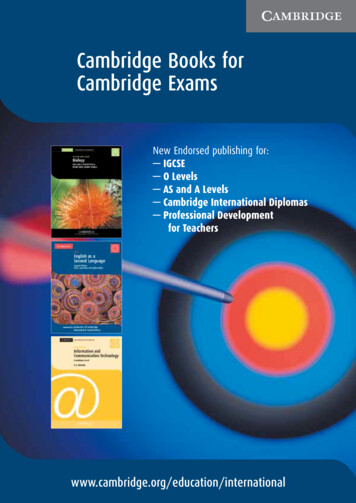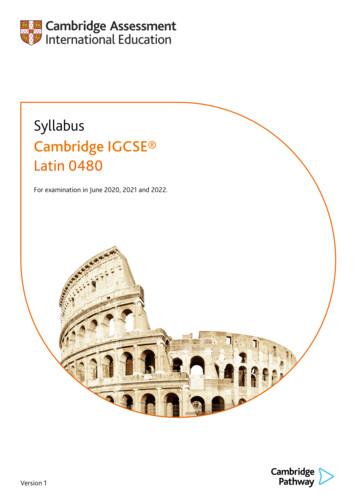
Transcription
SyllabusCambridge IGCSE Latin 0480For examination in June 2020, 2021 and 2022.Version 1
Changes to the syllabus for 2020, 2021 and 2022The syllabus has been updated. The latest syllabus is version 1, published September 2017.The prescribed texts for 2020, 2021 and 2022 have been updated on page 12.Significant changes to the syllabus are indicated by black vertical lines either side of the text.You are strongly advised to read the whole syllabus before planning your teaching programme.Cambridge Assessment International Education is part of the Cambridge Assessment Group. Cambridge Assessment isthe brand name of the University of Cambridge Local Examinations Syndicate (UCLES), which itself is a department of theUniversity of Cambridge.UCLES retains the copyright on all its publications. Registered centres are permitted to copy material from this booklet fortheir own internal use. However, we cannot give permission to centres to photocopy any material that is acknowledged to athird party even for internal use within a centre.
Contents1. Introduction. 21.11.21.31.41.5Why choose Cambridge International?Why choose Cambridge IGCSE?Why choose Cambridge IGCSE Latin?Cambridge ICE (International Certificate of Education)How can I find out more?2. Teacher support. 52.1 Support materials2.2 Endorsed resources2.3 Training3. Assessment at a glance. 64. Syllabus aims and assessment objectives. 74.14.24.34.44.5Syllabus aimsAssessment objectivesScheme of assessmentRelationship between assessment objectives and componentsGrade descriptions5. Syllabus content. 105.1 Paper 1: Language5.2 Paper 2: Literature6Vocabulary list. 137. Other information. 31
Introduction1.Introduction1.1 Why choose Cambridge International?Cambridge Assessment International Education prepares school students for life, helping them develop aninformed curiosity and a lasting passion for learning. We are part of the University of Cambridge.Our international qualifications are recognised by the world’s best universities and employers, givingstudents a wide range of options in their education and career. As a not-for-profit organisation, we devoteour resources to delivering high-quality educational programmes that can unlock learners’ potential.Our programmes and qualifications set the global standard for international education. They are createdby subject experts, rooted in academic rigour and reflect the latest educational research. They provide astrong platform for students to progress from one stage to the next, and are well supported by teaching andlearning resources.Every year, nearly a million Cambridge learners from 10 000 schools in 160 countries prepare for their futurewith an international education from Cambridge International.Cambridge learnersOur mission is to provide educational benefit through provision of international programmes andqualifications for school education and to be the world leader in this field. Together with schools, wedevelop Cambridge learners who are: confident in working with information and ideas – their own and those of others responsible for themselves, responsive to and respectful of others reflective as learners, developing their ability to learn innovative and equipped for new and future challenges engaged intellectually and socially, ready to make a difference.RecognitionCambridge IGCSE is recognised by leading universities and employers worldwide, and is an internationalpassport to progression and success. It provides a solid foundation for moving on to higher level studies.UK NARIC, the national agency in the UK for the recognition and comparison of international qualificationsand skills, has carried out an independent benchmarking study of Cambridge IGCSE and found it to becomparable to the standard of GCSE in the UK. This means students can be confident that their CambridgeIGCSE qualifications are accepted as equivalent to UK GCSEs by leading universities worldwide.Learn more at www.cambridgeinternational.org/recognitionSupport for teachersA wide range of materials and resources is available to support teachers and learners in Cambridge schools.Resources suit a variety of teaching methods in different international contexts. Through subject discussionforums and training, teachers can access the expert advice they need for teaching our qualifications. Moredetails can be found in Section 2 of this syllabus and at www.cambridgeinternational.org/teachers2Cambridge IGCSE Latin 0480. Syllabus for examination in 2020, 2021 and 2022.
IntroductionSupport for exams officersExams officers can trust in reliable, efficient administration of exams entries and excellent personal supportfrom our customer services. Learn more at www.cambridgeinternational.org/examsofficersOur systems for managing the provision of international qualifications and education programmesfor learners aged 5 to 19 are certified as meeting the internationally recognised standard for qualitymanagement, ISO 9001:2008. Learn more at www.cambridgeinternational.org/ISO90011.2 Why choose Cambridge IGCSE?Cambridge IGCSEs are international in outlook, but retain a local relevance. The syllabuses provideopportunities for contextualised learning and the content has been created to suit a wide variety of schools,avoid cultural bias and develop essential lifelong skills, including creative thinking and problem-solving.Our aim is to balance knowledge, understanding and skills in our programmes and qualifications to enablestudents to become effective learners and to provide a solid foundation for their continuing educationaljourney.Through our professional development courses and our support materials for Cambridge IGCSEs, weprovide the tools to enable teachers to prepare students to the best of their ability and work with us in thepursuit of excellence in education.Cambridge IGCSEs are considered to be an excellent preparation for Cambridge International AS & A Levels,the Cambridge AICE (Advanced International Certificate of Education) Diploma, Cambridge Pre-U, and othereducation programmes, such as the US Advanced Placement program and the International BaccalaureateDiploma programme. Learn more about Cambridge IGCSEs at www.cambridgeinternational.org/igcseGuided learning hoursCambridge IGCSE syllabuses are designed on the assumption that learners have about 130 guided learninghours per subject over the duration of the course, but this is for guidance only. The number of hoursrequired to gain the qualification may vary according to local curricular practice and the students’ priorexperience of the subject.1.3 Why choose Cambridge IGCSE Latin?Cambridge IGCSE Latin is accepted by universities and employers worldwide as proof of knowledge andunderstanding of Latin language and literature.This Latin syllabus aims to develop learners’ ability to understand Latin vocabulary, morphology and syntax,and to read, understand and appreciate some of the best of Latin literature.Learners will develop an analytical approach to language and be better equipped to compare the structuresof Latin with those of other languages, as well as be able to recognise the impact of Latin on modernEnglish. The course also encourages learners to develop an appreciation of literature, in terms of both itscontent and style, and of its social and historical context.Cambridge IGCSE Latin 0480. Syllabus for examination in 2020, 2021 and 2022.3
IntroductionCambridge IGCSE Latin enables learners to gain: the ability to translate and understand Latin, and to relate the linguistic structures and vocabulary of Latinto other languages, including English an appreciation of some of the literature which forms much of the foundation of the Western tradition an interest in, and enthusiasm for, learning about the past the ability to present clear, logical arguments which are well supported by evidence.Prior learningLearners beginning this course are not expected to have studied Latin previously.ProgressionCambridge IGCSE Certificates are general qualifications that enable learners either to progress directly toemployment or to proceed to further qualifications.1.4 Cambridge ICE (International Certificate of Education)Cambridge ICE is a group award for Cambridge IGCSE. It gives schools the opportunity to benefitfrom offering a broad and balanced curriculum by recognising the achievements of learners who passexaminations in a number of different subjects.Learn more about Cambridge ICE at www.cambridgeinternational.org/cambridgeice1.5 How can I find out more?If you are already a Cambridge schoolYou can make entries for this qualification through your usual channels. If you have any questions, pleasecontact us at info@cambridgeinternational.orgIf you are not yet a Cambridge schoolLearn about the benefits of becoming a Cambridge school at www.cambridgeinternational.org/startcambridgeEmail us at info@cambridgeinternational.org to find out how your organisation can register to become aCambridge school.4Cambridge IGCSE Latin 0480. Syllabus for examination in 2020, 2021 and 2022.
Teacher support2.Teacher support2.1 Support materialsYou can go to our public website at www.cambridgeinternational.org/igcse to download current andfuture syllabuses together with specimen papers or past question papers, examiner reports and gradethreshold tables from one series.For teachers at registered Cambridge schools a range of additional support materials for specific syllabusesis available from the School Support Hub. Go to www.cambridgeinternational.org/support (username andpassword required). If you do not have access, speak to the Teacher Support coordinator at your school.2.2 Endorsed resourcesWe work with publishers who provide a range of resources for our syllabuses including print and digitalmaterials. Resources endorsed by Cambridge International go through a detailed quality assurance processto make sure they provide a high level of support for teachers and learners.We have resource lists which can be filtered to show all resources, or just those which are endorsed byCambridge International. The resource lists include further suggestions for resources to support teaching.See centre for further information.2.3 TrainingWe offer a range of support activities for teachers to ensure they have the relevant knowledge and skills todeliver our qualifications. See www.cambridgeinternational.org/events for further information.Cambridge IGCSE Latin 0480. Syllabus for examination in 2020, 2021 and 2022.5
Assessment at a glance3.Assessment at a glanceFor the Cambridge IGCSE in Latin, candidates take two compulsory components: Paper 1 Language andPaper 2 Literature.Candidates are awarded grades ranging from A* to G.Candidates take:Paper 1 Language1 hour 30 minutesThere are two sections in this paper. In Section A, candidates translate a passage of Latin prose intoEnglish. In Section B, candidates answer comprehension questions on a passage of Latin prose andgive four English words which derive from given Latin words.160 marks weighted at 50% of total marks availableandPaper 2 Literature1 hour 30 minutesCandidates answer questions on the prescribed texts. Questions test comprehension, translation,scansion and appreciation of the literature.80 marks weighted at 50% of total marks availableAvailabilityThis syllabus is examined in the June examination series.This syllabus is available to private candidates.Detailed timetables are available from www.cambridgeinternational.org/timetablesAll Cambridge schools are allocated to one of six administrative zones. Each zone has a specific timetable.From 2020 these syllabuses are not available in all administrative zones. To find out about the availabilityvisit the syllabus page at www.cambridgeinternational.org/igcseCombining this with other syllabusesCandidates can combine this syllabus in an examination series with any other Cambridge Internationalsyllabus, except: syllabuses with the same title at the same level.Please note that Cambridge IGCSE, Cambridge IGCSE (9–1) and Cambridge O Level syllabuses are at thesame level.6Cambridge IGCSE Latin 0480. Syllabus for examination in 2020, 2021 and 2022.
Syllabus aims and assessment objectives4.Syllabus aims and assessment objectives4.1 Syllabus aimsThe aims of the Cambridge IGCSE Latin syllabus are to enable candidates to develop: an understanding of the Latin language the ability to read, understand, appreciate and respond to some Latin literature an understanding of some of the elements of Roman civilisation an analytical approach to language by seeing English in relation to a language of very different structureand by observing the influence of Latin on English an awareness of the motives and attitudes of people of a different time and culture, while consideringthe legacy of Rome to the modern world a greater understanding of a range of aesthetic, ethical, linguistic, political, religious and social issues an excellent foundation of knowledge for advanced study.4.2 Assessment objectivesThere are three separate assessment objectives: AO1, AO2 and AO3.AO1 Linguistic knowledge with understandingTo pass Cambridge IGCSE Latin, candidates should be able to: express, according to context, the meaning of linguistic elements (vocabulary, morphology and syntax) express, according to context, the meaning of Latin sentences written in Latin word order translate a passage of Latin into English understand the details and general meaning of a passage of Latin give English words which derive from given Latin words.AO2 Literary knowledge with understandingTo pass Cambridge IGCSE Latin, candidates should be able to: describe character, action and context select details from the text explain meanings and references translate a portion of the text explain matters relating to the social and historical context scan two lines of hexameter verse.AO3 Literary criticism with personal responseTo pass Cambridge IGCSE Latin, candidates should be able to: analyse and evaluate style, tone and metre (where appropriate) select evidence to make judgements on the social and historical context make a reasoned personal response to the literature.Cambridge IGCSE Latin 0480. Syllabus for examination in 2020, 2021 and 2022.7
Syllabus aims and assessment objectives4.3 Scheme of assessmentPaper 1 Language160 marks, 1 hour 30 minsCandidates must answer both Section A and Section B.In Section A, candidates translate into English a passage of Latin prose. The translation passage will beapproximately 120 words in length. Candidates are expected to render the translation passage into sensibleEnglish and not rely on a word-for-word substitution translation. The maximum mark for Section A is 110.In Section B, candidates answer comprehension questions on a passage of Latin prose. One question testsunderstanding of the derivation of English words from Latin words contained in the passage. The maximummark for Section B is 50.Paper 2 Literature80 marks, 1 hour 30 minsCandidates must answer all the questions.This paper contains two passages from each of the prescribed texts with questions on each passage.Through answering the questions, candidates are expected to show understanding of the literature, withreference to its subject matter, presentation, genre, metre and background. In addition, the questions testcandidates’ ability to translate the text. On each text there is one 10-mark question, which asks candidatesto express opinions on matters relating to the social and historical context of the literature and/or theliterature itself. Candidates are expected to support their opinions with evidence from the texts.4.4 Relationship between assessment objectives and componentsAssessment Objective8Paper 1Paper 2Total forqualification100%–50%AO1Linguistic knowledge with understandingAO2Literary knowledge with understanding–50–60%25–30%AO3Literary criticism with personal response–40–50%20–25%Cambridge IGCSE Latin 0480. Syllabus for examination in 2020, 2021 and 2022.
Syllabus aims and assessment objectives4.5 Grade descriptionsThe aim of these grade descriptions is to give a general indication of the standards of achievement thatcandidates who receive Grades A, C and F are likely to have shown or achieved.Candidates may perform much better in some parts of the examination than others, and their final gradedepends in practice on the extent to which the candidate has met the assessment objectives overall.Grade ATo achieve a Grade A, candidates will be able to: demonstrate a good grasp of Latin vocabulary, morphology and syntax understand unseen passages of Latin and translate them into English accurately and clearly demonstrate a thorough knowledge of the prescribed texts and give an appreciative response to theirliterary qualities.Grade CTo achieve a Grade C, candidates will be able to: demonstrate an adequate grasp of the language make sense of unseen passages of Latin and translate them into English with some accuracy and withmost of the meaning conveyed show a reasonable knowledge of the prescribed texts and make literary and background commentswhich usually have some relevance, although the material may not be recalled perfectly.Grade FTo achieve a Grade F, candidates will be able to: demonstrate some grasp of the basics of the language make limited sense of unseen passages of Latin and translate isolated sections into English withminimal accuracy show basic recall and understanding of prescribed texts and background questions.Cambridge IGCSE Latin 0480. Syllabus for examination in 2020, 2021 and 2022.9
Syllabus content5.Syllabus contentThe Cambridge IGCSE Latin syllabus places equal emphasis on the study of the Latin language and thestudy of Latin prose and verse literature in its social and historical context. No particular course is specifiedfor this syllabus.5.1 Paper 1: LanguageVocabularyA detailed vocabulary list is available in section 6.MorphologyNounsthe five declensions and irregular nouns from the vocabulary list.Adjectivesof first, second and third declension.Comparison of adjectivesall regular examples, including those in -ilis; irregular adjectives bonus,malus, magnus, parvus, multus, pauci.Adverbs and comparisonof adverbsall adverbial equivalents of regular adjectives and the irregularadjectives given above; also diu, prope, saepe.Pronouns (etc.)ego, tu, nos, vos, is, se, hic, ille, idem, ipse, iste, qui, quidam, quis,aliquis, quisque, nullus, solus, totus, alius, alter, uter.Verbsall parts of regular and irregular verbs, including deponent,semi‑deponent and defective verbs odi, coepi, memini, but only inquitfrom inquam; common compounds, e.g. transeo trans eo.Prepositions(a) those with the accusative: ad, ante, apud, circum, contra, extra,inter, intra, ob, per, post, praeter, prope, propter, trans;(b) those with the ablative: a (ab), cum, de, e (ex), pro, sine;(c) those with the accusative and the ablative: in, sub, super.Numerals10cardinal: 1 to 100, 500, 1000; ordinal: 1st to 10th.Cambridge IGCSE Latin 0480. Syllabus for examination in 2020, 2021 and 2022.
Syllabus contentSyntax Case usage Agent and instrument Expressions of place, time and space Expressions of price and value Verbs used with dative and ablative Ablative absolute Partitive genitive Verbs used with prolative infinitive Gerunds and gerundives Direct questions, including -ne, nonne, num and interrogative pronouns, adjectives and adverbs Direct command (2nd person) Prohibitions using noli, nolite Indirect statement Indirect command with prolative infinitive Conditional clauses with the indicative Common impersonal verbs Causal clauses with indicative (quod, quia, quoniam) Temporal clauses with indicative (including dum with the present) Concessive clauses with indicative (quamquam, etiamsi) Comparison clauses with indicative Indirect command with ut and ne Indirect question Purpose and result clauses Clauses of fearing Conditional sentences with subjunctive Causal clauses with subjunctive Temporal clauses with subjunctive Concessive clauses with subjunctive (quamvis, licet, cum, etiamsi)Cambridge IGCSE Latin 0480. Syllabus for examination in 2020, 2021 and 2022.11
Syllabus content5.2 Paper 2: LiteratureThe prescribed texts for 2020,2021 and 2022 are listed below.VerseVirgil, Aeneid Book 6, lines 264–416 (di, quibus imperium est animarum . limo glaucaque exponit in ulva)No particular edition is specified as availability differs widely between countries.ProseIntroducing Cicero Chapter 9, Denunciation of Catiline (Scottish Classics Group, 2013 – other editions areavailable)12Cambridge IGCSE Latin 0480. Syllabus for examination in 2020, 2021 and 2022.
Vocabulary list6Vocabulary listIn addition to words on the list, candidates will be expected to be familiar with: all adverbial equivalents of regular adjectives, as well as those of irregular adjectives listed here comparative and superlative forms of adjectives and adverbs as detailed above cardinal numbers 1 to 100, 500, 1000, and ordinals 1st to 10th compound verbs which are formed using prepositions in the list, e.g. transeo.Proper nouns and related adjectives (excluding Italia, Roma and Romanus) will be glossed.Keyind. indicativeabl. ablativesubj. subjunctivesg. singulardep. deponentpl. plural(1), (2), (3), (4) first, second, third, fourth conjugationm. masculineacc. accusativef. femininegen. genitiven. neuterdat. dativeAa (ab) abl.by, fromabsum, abesse, afuiI am absent, I am awayaccipio, -ere, accepi, acceptumI receive, I acceptacer, acris, acrekeen, fierceac, atqueandad acc.to, towards, nearadeoto such an extent, so muchadhucstill, up till nowadiuvo (1)I helpadsum, adesse, adfuiI am present, I am hereadvenio (4)I reach, I arriveadulescens, adulescentis m. f.young man, young womanaedifico (1)I buildaeger, -gra, -grumill, sickager, agri m.fieldaggredior, aggredi, aggressus sumI attackagmen, agminis n.column (of men)ago, -ere, egi, actumI do, drive, spend (time)gratias agoI give thanksagricola, agricolae m.farmeraliquis, -qua, -quidsomeone, anyoneCambridge IGCSE Latin 0480. Syllabus for examination in 2020, 2021 and 2022.13
Vocabulary listalius, -a, -ud (alii alii)another, other (some others)alter, altera, alterumthe other, secondaltus, -a, -umhigh, deepambulo (1)I walkamica, amicae f.friend (female)amicus, amici m.friend (male)amitto, -ere, amisi, amissumI loseamo (1)I loveamor, amoris m.lovean (utrum . an)or (whether . or)ancilla, ancillae f.slave-girl, maidanimus, animi m.mind, heart, feeling, spiritin animo habeo (2)annus, anni m.yearante acc.before, in front ofanteapreviouslyappareo (2)I appearappropinquo (1) dat.I approachaptus, -a, -umsuitable, appropriateapud acc.with, among, at the house ofaqua, aquae f.waterarcesso, -ere, -ivi, -itumI summon, I callarbor, arboris f.treearma, armorum n. pl.arms, weaponsars, artis f.art, skillascendo, -ere, ascendi, ascensumI climb, I go upatrox, atrocis m. f. n.harsh, terribleattonitus, -a, -umastonishedaudax, audacis m. f. n.boldaudeo, -ere, ausus sumI dareaudio (4)I hearaufero, auferre, abstuli, ablatumI take away, I stealaut (aut aut)or (either or)autembut, howeverauxilium, auxilii n.helpB14I have in mind, I intendbarbarus, -a, -umbarbarianbellum, belli n.warbenewellbenignus, -a, -umkindCambridge IGCSE Latin 0480. Syllabus for examination in 2020, 2021 and 2022.
Vocabulary listbibo, -ere, bibi, –I drinkbonus, -a, -umgoodbrevis, -is, -eshortCcado, -ere, cecidi, casumI fallcaedo, -ere, cecidi, caesumI cut, I killcaelum, caeli n.skycallidus, -a, -umclever, cunningcampus, campi m.plaincanis, canis m. f.dogcapio, -ere, cepi, captumI take, I capturecaptivus, captivi m.prisonercaput, capitis n.headcarus, -a, -umdearcastra, castrorum n. pl.campcasus, casus m.event, accident, misfortunecausa, causae f.cause, reasoncedo, -ere, cessi, cessumI go, I give way, I yieldceler, -is, -eswift, fastcelo (1)I hide, I concealcena, cenae f.dinnerceno (1)I dinecenturio, centurionis m.centurioncertus, -a, -umcertain, definiteceteri, -ae, -athe rest (of)cibus, cibi m.foodcircum acc.aroundcivis, civis m. f.citizencivitas, civitatis f.state, communityclamo (1)I shoutclamor, clamoris m.shoutcoepi, coepisse, coeptum (defective)I begin, I have beguncogito (1)I thinkcognosco, -ere, cognovi, cognitumI get to know, I find outcogo, -ere, coegi, coactumI compelcolligo, -ere, collegi, collectumI collectcolloquor (3 dep.)I converse, I hold a conversationcomes, comitis m. f.companioncomparo (1)I prepare, I gain, I obtainconficio, -ere, confeci, confectumI finish, I wear outconiunx, coniugis m. f.husband, wifeCambridge IGCSE Latin 0480. Syllabus for examination in 2020, 2021 and 2022.15
Vocabulary listconor (1 dep.)I tryconsilium, consilii n.plan, policyconsilium capio, -ere, cepi, captumconspicio, -ere, conspexi, conspectumI catch sight of, I seeconstituo, -ere, constitui, constitutumI decideconsul, consulis m.consulconsumo, -ere, consumpsi, consumptumI eat, I use upcontendo, -ere, contendi, contentumI hurry, I stretch, I fightcontentus, -a, -umsatisfied, happy, contentcontra acc.againstconvenio, -ire, conveni, conventumI meet, I gather, I come togethercopiae, copiarum f. pl.forces, troopscorpus, corporis n.bodycotidieevery daycrastomorrowcredo, -ere, credidi, creditum dat.I believe, I trustcrimen, criminis n.charge, accusationcrudelis, -is, -ecruelculpo (1)I find fault with, I blamecum abl.withcum ind.whencum subj.when, since, althoughcupio, -ere, cupivi, cupitumI desirecur?why?cura, curae f.care, concerncurro, -ere, cucurri, cursumI runcustodio (4)I guardcustos, custodis m.guardD16I think of a plan, I have an ideade abl.down from, concerningdea, deae f.goddessdebeo (2)I owe, I ought, I have todecipio, -ere, decepi, deceptumI deceivededo, -ere, dedidi, deditumI surrenderdefendo, -ere, defendi, defensumI defenddeindethen, nextdeleo, -ere, delevi, deletumI destroydelibero (1)I deliberate, I consider seriouslydescendo, -ere, descendi, descensumI descenddespero (1)I give up hope, I despairdeus, dei m.goddico, -ere, dixi, dictumI say, I tellCambridge IGCSE Latin 0480. Syllabus for examination in 2020, 2021 and 2022.
Vocabulary listdies, diei m. f.daydifficilis, -is, -edifficultdignus, -a, -um abl.worthy, deserving (of)diligens, -ntis m. f. n.diligent, hard-workingdiligentia, diligentiae f.diligence, industry, caredirus, -a, -umawful, dreadfuldiscedo, -ere, discessi, discessumI depart, I go awaydisciplina, disciplinae f.training, education, disciplinedisco, -ere, didici, –I learndiufor a long timedives, divitis m. f. n.rich, wealthydo, dare, dedi, datumI givedoceo, -ere, docui, doctumI teachdolor, doloris m.pain, grief, sorrowdomina, dominae f.mistressdominus, domini m.masterdomus, domus f.housedonum, doni n.giftdormio (4)I sleepdubito (1)I doubt, I hesitatedubius, -a, -umdoubtfulduco, -ere, duxi, ductumI leaddum ind.whiledurus, -a, -umhard, harshdux, ducis m. f.leader, commander, guideEe (ex) abl.out of, fromecce!look! behold!efficio, -icere, effeci, effectumI bring about, I accomplisheffugio, -ere, effugi, –I escape, I fleeegoIegredior, egredi, egressus sumI go outeheu!oh dear! alas!emo, -ere, emi, emptumI buyenimforeoto there, thithereo, ire, i(v)i, itumI goepistula, epistulae f.lettereques, equitis m.cavalryman, rider; pl. cavalryequus, equi m.horseet (et et)and (both and)etiameven, alsoCambridge IGCSE Latin 0480. Syllabus for examination in 2020, 2021 and 2022.17
Vocabulary listexcito (1)I rouse, I stir upexeo, exire, exii, exitumI go outexercitus, exercitus m.armyexspecto (1)I expect, I wait forextra acc.outside, beyondextremus, -a, -umfurthest, lastFfabula, fabulae f.story, talefacilis, -is, -eeasyfacio, -ere, feci, factumI make, I dofallo, -ere, fefelli, falsumI deceive, I trickfama, famae f.rumour, reputationfelix, felicis m. f. n.lucky, happyfemina, feminae f.womanfero, ferre, tuli, latumI carry, I bring, I bear, I endureferox, ferocis m. f. n.fiercefessus, -a, -umtiredfidelis, -is, -efaithful, loyalfides, fidei f.faith, confidence, honestyfilia, filiae f.daughterfilius, filii m.sonfinis, finis m.endfio, fieri, factus sumI become, I am madeflumen, fluminis n.riverfons, fontis m.spring, fountainforma, formae f.form, beauty, shapeforteby chancefortis, -is, -ebravefortuna, -ae f.fortune, chance, luckforum, fori n.forum, market-placefrango, -ere, fregi, fractumI breakfrater, fratris m.brotherfrustrain vainfuga, fugae f.flightfugio, -ere, fugi, –I flee, I run awayG18gaudeo, -ere, gavisus sumI am happy, I rejoicegaudium, gaudii n.joygens, gentis f.tribe, nation, raceCambridge IGCSE Latin 0480. Syllabus for examination in 2020, 2021 and 2022.
Vocabulary listgero, -ere, gessi, gestumbellum geroI do, I wear, I carryI wage wargladiator, gladiatoris m.gladiatorgladius, gladii m.swordgloria, gloriae f.glorygravis, -is, -eheavy, severe, importantHhabeo (2)I havehabito (1)I live, I residehasta, hastae f.spearheriyesterdayhicherehic, haec, hocthis (he, she, it)hincfrom here, hencehodietodayhomo, hominis m.man, personhora, horae f.hourhortor (1 dep.)I encouragehortus, horti m.gardenhostis, hostis m. f.enemyhucto here, hitherIiaceo (2)I lieiacio, -ere, ieci, iactumI throwiamnow, alreadyianua, ian
Cambridge IGCSE Latin 0480. Syllabus for examination in 2020, 2021 and 2022. 7 4. Syllabus aims and assessment objectives 4.1 Syllabus aims The aims of the Cambridge IGCSE Latin syllabus are to enable candidates to develop: an understanding of the Latin language the ability to read, understand, appreciate and respond to some Latin .
